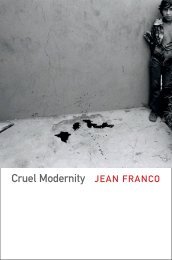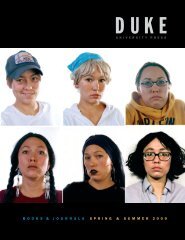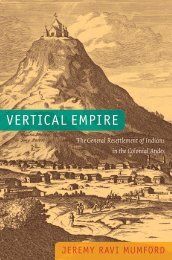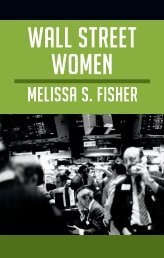Spring 2013 Catalog - Duke University Press
Spring 2013 Catalog - Duke University Press
Spring 2013 Catalog - Duke University Press
Create successful ePaper yourself
Turn your PDF publications into a flip-book with our unique Google optimized e-Paper software.
Imperial Debris<br />
On Ruins and Ruination<br />
ann laura stoler, editor<br />
“Imperial Debris questions some of our deepest assumptions about violence<br />
and its residues. This astute, wide-ranging, and ambitious volume refocuses<br />
our attention on the incremental processes of ruination that are typically<br />
overlooked in favor of official ruins. The result is a major intervention<br />
in postcolonial and visual studies.”—ROB NIXON, author of Slow Violence<br />
and the Environmentalism of the Poor<br />
Imperial Debris redirects critical focus<br />
from ruins as evidence of the past to<br />
“ruination” as the processes through<br />
which imperial power occupies the<br />
present. Ann Laura Stoler’s introduction<br />
is a manifesto, a compelling call<br />
for postcolonial studies to expand its<br />
analytical scope to address the toxic<br />
but less perceptible corrosions and<br />
violent accruals of colonial aftermaths,<br />
as well as their durable traces on<br />
the material environment and peoples’<br />
bodies and minds. In their provocative, tightly focused responses<br />
to Stoler, the contributors explore subjects as seemingly diverse<br />
as villages submerged during the building of a massive dam in<br />
southern India, Palestinian children taught to envision and document<br />
ancestral homes razed by the Israeli military, and survival on<br />
the toxic edges of oil refineries and amid the remains of apartheid<br />
in Durban, South Africa. They consider the significance of Cold War<br />
imagery of a United States decimated by nuclear blast, perceptions<br />
of a swath of Argentina’s Gran Chaco as a barbarous void, and the<br />
enduring resonance, in contemporary sexual violence, of atrocities<br />
in King Leopold’s Congo. Reflecting on the physical destruction of<br />
Sri Lanka, on Detroit as a colonial metropole in relation to sites<br />
of ruination in the Amazon, and on interactions near a UNESCO World<br />
Heritage Site in the Brazilian state of Bahia, the contributors attend<br />
to present-day harms in the occluded, unexpected sites and situations<br />
where earlier imperial formations persist.<br />
Contributors<br />
Ariella Azoulay, John F. Collins, Sharad Chari, E. Valentine Daniel, Gastón Gordillo,<br />
Greg Grandin, Nancy Rose Hunt, Joseph Masco, Vyjayanthi Venuturupalli Rao,<br />
Ann Laura Stoler<br />
Ann Laura Stoler is the Willy Brandt Distinguished <strong>University</strong> Professor<br />
of Anthropology and Historical Studies at the New School for Social<br />
Research.<br />
ANTHROPOLOGY/HISTORY/POSTCOLONIAL STUDIES<br />
May 336 pages, 29 illustrations<br />
paper, 978–0–8223–5361–4, $25.95/£16.99<br />
cloth, 978–0–8223–5348–5, $94.95/£71.00<br />
general interest<br />
Markets of Sorrow,<br />
Labors of Faith<br />
New Orleans in the Wake of Katrina<br />
vincanne adams<br />
“Markets of Sorrow, Labors of Faith is public anthropology at its finest.<br />
Vincanne Adams has written a devastating portrait of market failure<br />
in the wake of Hurricane Katrina, and a cautionary tale about what<br />
might happen if the private sector takes charge of the welfare state.”<br />
—ERIC KLINENBERG, author of Heat Wave: A Social Autopsy of Disaster<br />
in Chicago<br />
Markets of Sorrow, Labors of Faith<br />
is an ethnographic account of<br />
long-term recovery in post-Katrina<br />
New Orleans. It is also a sobering<br />
exploration of the privatization of<br />
vital social services under marketdriven<br />
governance. In the wake<br />
of Hurricane Katrina, public agencies<br />
subcontracted disaster relief<br />
to private companies that turned<br />
the humanitarian work of recovery<br />
into lucrative business. These<br />
enterprises profited from the very suffering that they failed to<br />
ameliorate, producing a second-order disaster that exacerbated<br />
inequalities based on race and class and leaving residents to<br />
rebuild almost entirely on their own.<br />
Filled with the often desperate voices of residents who returned<br />
to New Orleans, Markets of Sorrow, Labors of Faith describes the<br />
human toll of disaster capitalism and the affect economy it has<br />
produced. While for-profit companies delayed delivery of federal<br />
resources to returning residents, faith-based and nonprofit groups<br />
stepped in to rebuild, compelled by the moral pull of charity and<br />
the emotional rewards of volunteer labor. Vincanne Adams traces<br />
the success of charity efforts, even while noting an irony of neoliberalism,<br />
which encourages the very same for-profit companies to<br />
exploit these charities as another market opportunity. In so doing,<br />
the companies profit not once but twice on disaster.<br />
Vincanne Adams is Professor of Medical Anthropology in the<br />
Department of Anthropology, History and Social Medicine at the<br />
<strong>University</strong> of California, San Francisco.<br />
CURRENT EVENTS/SOCIAL JUSTICE/ANTHROPOLOGY<br />
March 232 pages, 12 photographs<br />
paper, 978–0–8223–5449–9, $22.95/£14.99<br />
cloth, 978–0–8223–5434–5, $79.95/£60.00<br />
19












